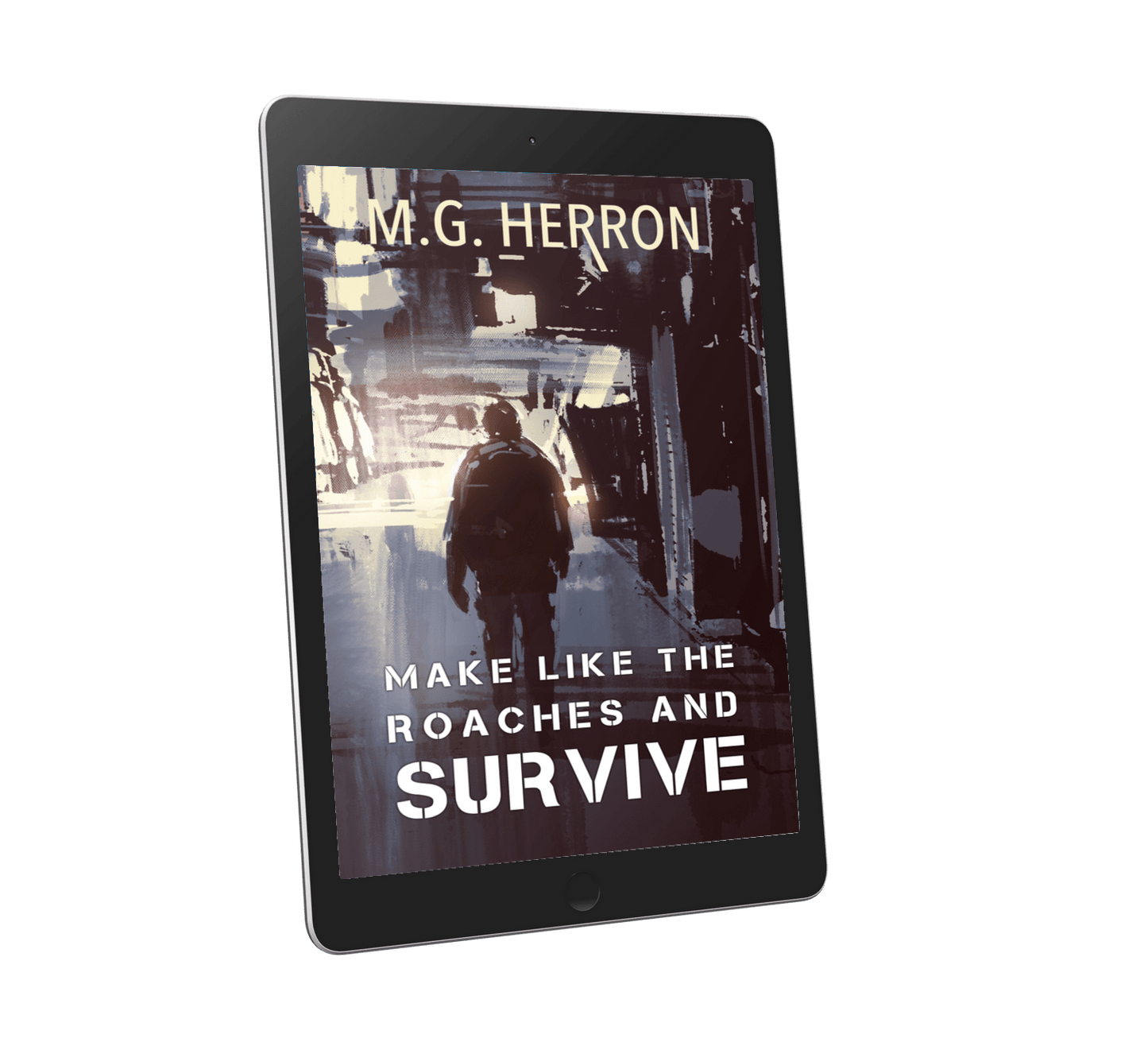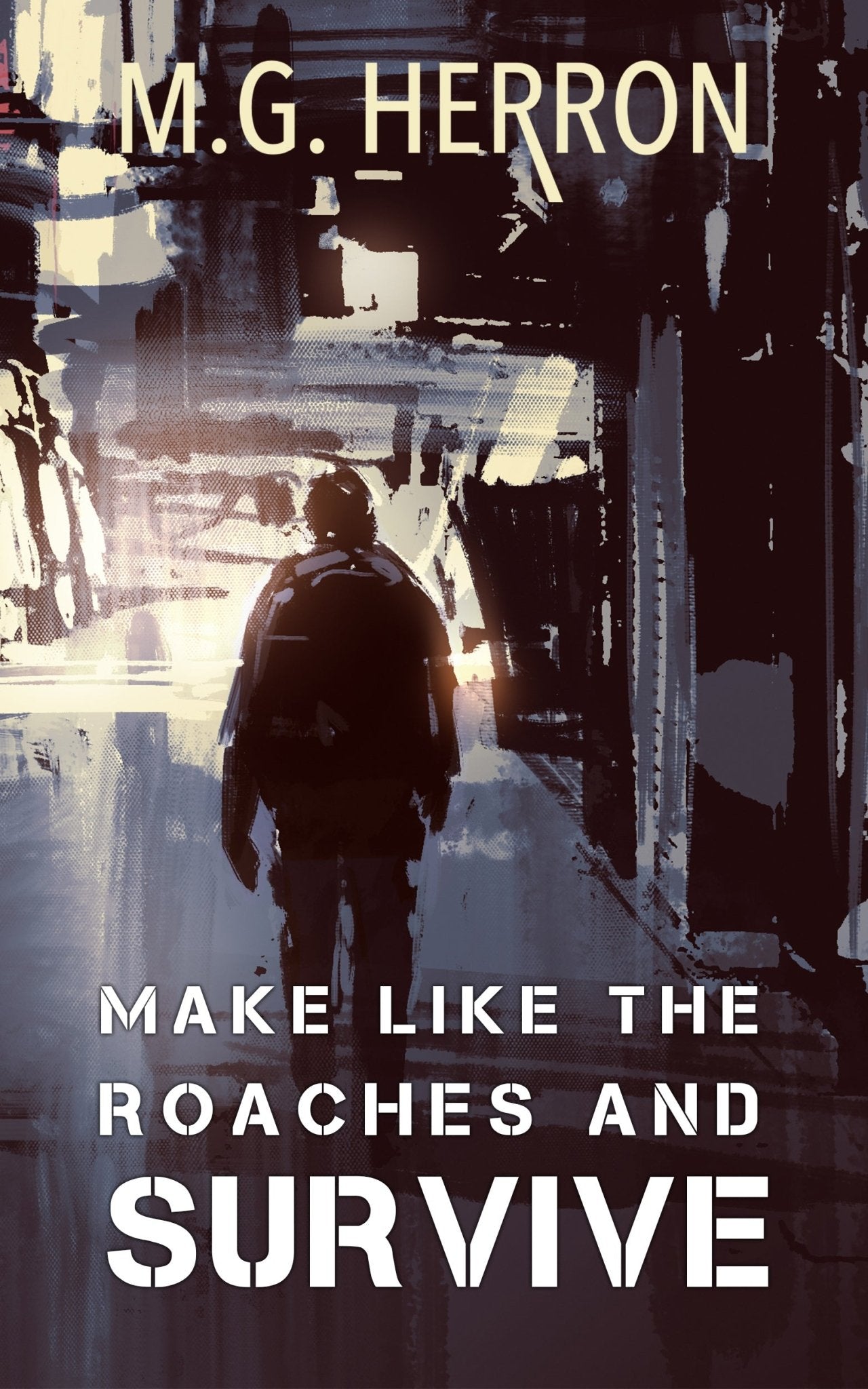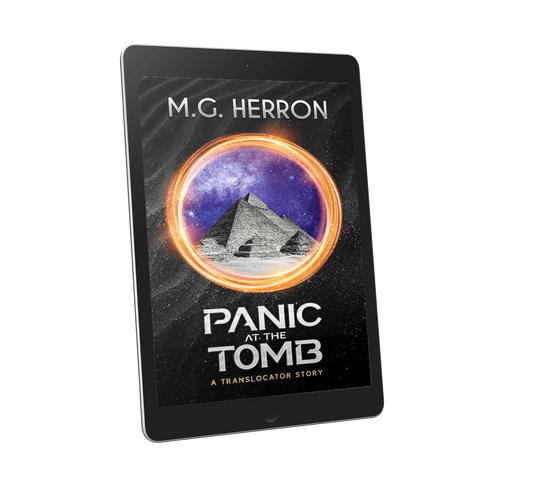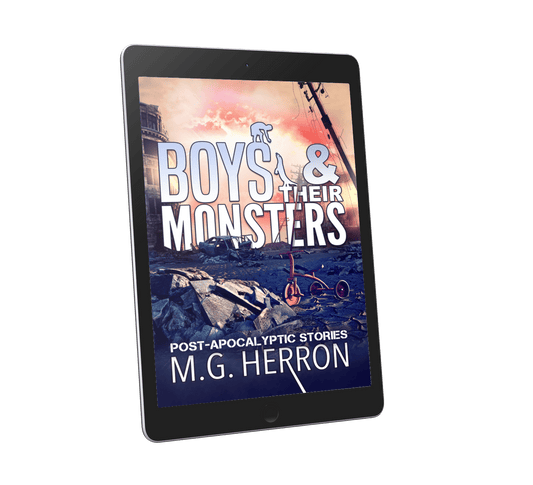Make Like the Roaches and Survive: A Science Fiction Story
Make Like the Roaches and Survive: A Science Fiction Story
- Short story
- Works on all devices (DRM-free)
- Delivered immediately via email
Couldn't load pickup availability
People used to say that after the apocalypse, only the roaches would survive.
Well, there were roaches all right. But that was just the beginning of my problems.
While the world was ending, I was trapped in a basement with only a feral cat to keep me company.
It took me weeks to dig my way out. And THEN it got strange...
I guess that's what happens when you get buried alive during an alien invasion.
Make Like The Roaches And Survive is a scrappy story of survival in a post-apocalyptic Earth ravaged by mysterious alien invaders.
| E-books are delivered by BookFunnel and are compatible with all e-readers and devices, ensuring a seamless reading experience. |
Read a sample
Read a sample
People used to say that after the apocalypse, only the roaches would survive.
Well, there were roaches all right. Plenty of ‘em. They seethed like a chittering brown tide through the cracked foundation and broken waterpipes in the basement of St. Mary-Corwin Medical Center. But that’s not all that survived. The roaches had company—me.
Things would have been simpler if it was just the roaches. Whoever imagined that only the roaches would make it had been deceived by the simplicity of the notion. Life is never that simple, and, as I would later learn, the apocalypse left behind all sorts of violently shaken stragglers in its wake.
The basement storage room of St. Mary’s that saved my life was once lined with wire racks. Those racks had been stacked with cardboard boxes of medical supplies—alcohol swabs, cotton swabs, tongue depressors, and the like. Eventually, I turned the place into a sort of den slash bedroom by pushing the wire racks all to one side, and laying down cardboard boxes to serve as a sleeping pallet on the other. It wasn’t the best bed I’d ever slept in, but trust me, if you’re desperate enough, you can get used to anything.
Fortunately for the cockroaches and me, the storage room had originally been constructed with an alternate purpose in mind. In early 1959, the basement had been designed to serve double duty as a fallout shelter. In paranoid times, it seemed a sensible hedge against the possibility of a nuclear strike. I thanked God every day for that healthy dose of paranoia, especially in the first few weeks, when I could still hear the fighting happening outside.
I’d wager that none of the hospital’s Cold War architects had imagined the shelter in the basement of St. Mary’s would make it through the '60s unused except as a depository for plastic gloves and saline solution. I only knew it was a bomb shelter because, during the summer after my junior year of high school, I got a job at St. Mary’s as a janitor and spent a lot of time in that basement.
My Aunt Maria, the woman who had been saddled with the burden of raising me in Pueblo while my delinquent addict mother wandered from one flop house to another, helped me land the job. I’d done lawn work, hedge trimming, and window washing on an ad hoc basis all my childhood. This was my first official employment, though. It wasn’t glamorous, but that was fine because I didn’t expect it to be. Mostly, I spent my days slopping a bleach-soaked mop across the floors, emptying trash cans, and lugging heavy boxes up and down the basement steps.
The job did afford certain freedoms. For example, I spent countless hours that summer hiding in the basement and watching funny YouTube videos on my phone. I was doing just that one afternoon, late in the summer, when my cell connection cut out, and the box-laden wire racks began to vibrate against the cement floor.
As I tried to sit up, the ground bucked and shook in a violent earthquake. Klaxons began to blare in the basement, nearly deafening me. A woman’s scream cut through the noise, only to be ended abruptly. Ambulance sirens wailed somewhere off in the distance. Three sharp gunshot reports echoed outside.
That was all I heard, at first. That was all the warning anyone got.
No one knew the Invaders were coming until they were upon us. Years later and miles away, all I’ve managed to kludge together is a partial picture of the strange beings from outer space that descended on our planet like a plague—a bipedal giant glimpsed through the fog. The desiccated carcass of one of their lizard-like cows. A vast footprint in the forest big enough to lay my whole body down in.
What I do know is that humanity was not prepared for the speed at which they cut across the world. The Invaders leveled cities, disabled the grid, shot our satellites out of orbit. Their superior forces sliced through the Armies and Air Forces of planet Earth like scissors through construction paper.
At the time, in that cramped little storage room surrounded by shelf upon shelf of boxes, I didn’t know what to think. Clearly, we were under attack. But was forty years after the Berlin Wall came down too late for the Russians to take their revenge?
Two things seemed certain: I was frightened out of my wits, and I needed to get home to my aunt to make sure she was okay.
Would you believe me if I told you I tried to make a break for it then? Would you believe me if I told you I managed three steps before a forty-pound box of saline solution tilted off a top shelf and clobbered me in the head, knocking me unconscious on the basement floor?
It was the luckiest moment of my life.
If you can call a man who survived the apocalypse lucky.


More short stories
Smaller stories. Same big ideas.
-
Not Alone: A First Contact Sci-Fi Story
Regular price $2.99Regular priceUnit price / per -
Souldescance: A Science Fiction Story
Regular price $2.99Regular priceUnit price / per -
Wendigo: An Urban Fantasy Story
Regular price $2.99Regular priceUnit price / per -
Sleepy Jean: A Science Fiction Story
Regular price $2.99Regular priceUnit price / per -
Centurion: A Science Fiction Story
Regular price $2.99Regular priceUnit price / per -
Reuben's Choice: A Translocator Story
Regular price $2.99Regular priceUnit price / per -
Panic at the Tomb: A Translocator Story
Regular price $2.99Regular priceUnit price / per -
Boys & Their Monsters: Post-Apocalyptic Stories
Regular price $4.99Regular priceUnit price / per -
Wetware Prophet: A Science Fiction Story
Regular price $2.99Regular priceUnit price / per -
Low Desert, High Mountain, Big Lizard: A Science Fiction Story
Regular price $2.99Regular priceUnit price / per -
Earworm: A Science Fiction Story
Regular price $2.99Regular priceUnit price / per -
The End of the World Is Better with Friends: A Science Fiction Story
Regular price $2.99Regular priceUnit price / per
Shop the best deals
Save up to 50% on exclusive book bundles!
-
Relics of the Ancients: Exclusive Audiobook Bundle
Regular price $23.99Regular priceUnit price / per$85.94Sale price $23.99Sale -
Relics of the Ancients: Exclusive E-book Bundle
Regular price $15.99Regular priceUnit price / per$38.94Sale price $15.99Sale -
Relics of the Ancients: Exclusive Paperback Bundle
Regular price $53.99Regular priceUnit price / per$99.96Sale price $53.99Sale -
Relics of the Ancients: Exclusive Signed Hardback Bundle
Regular price $89.99Regular priceUnit price / per$179.96Sale price $89.99Sale -
The Gunn Files: Exclusive E-book Bundle
Regular price $15.99Regular priceUnit price / per$31.96Sale price $15.99Sale -
The Gunn Files: Exclusive Paperback Bundle
Regular price $53.99Regular priceUnit price / per$99.96Sale price $53.99Sale -
The Gunn Files: Exclusive Signed Hardback Bundle
Regular price $89.99Regular priceUnit price / per$179.96Sale price $89.99Sale -
The Translocator Trilogy: Exclusive E-book Bundle
Regular price $13.99Regular priceUnit price / per$25.95Sale price $13.99Sale -
The Translocator Trilogy: Exclusive Paperback Bundle
Regular price $34.99Regular priceUnit price / per$69.97Sale price $34.99Sale
























